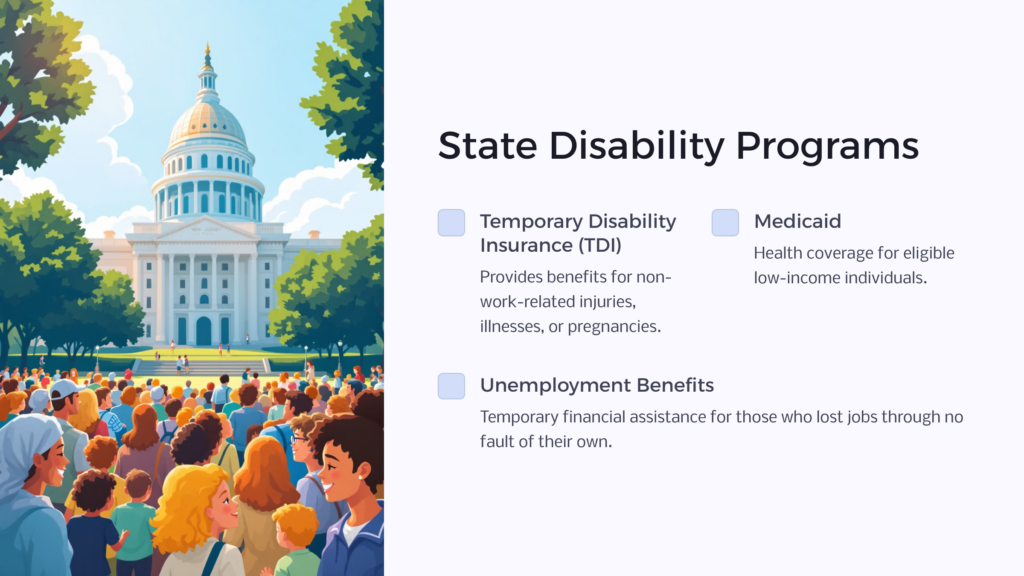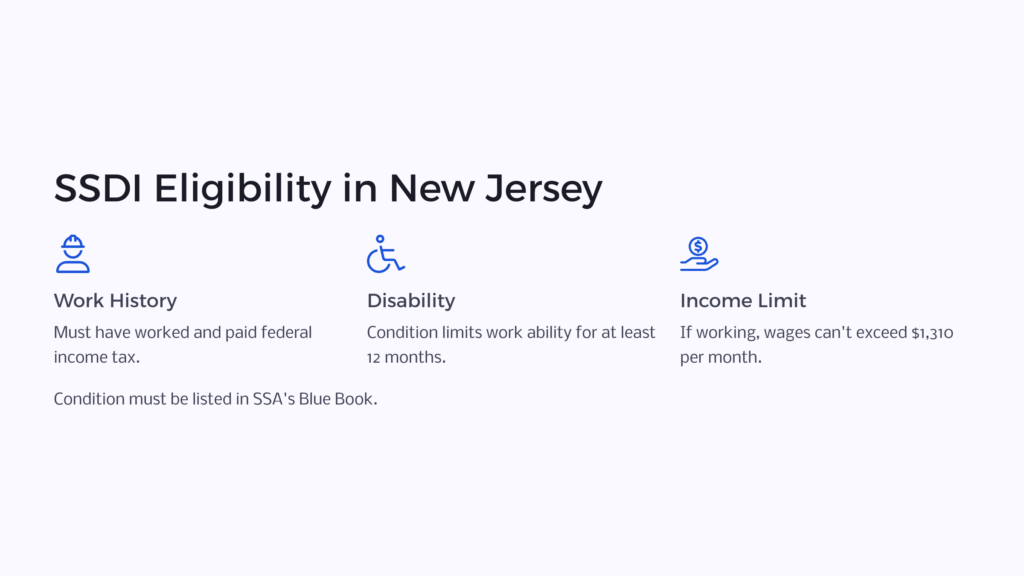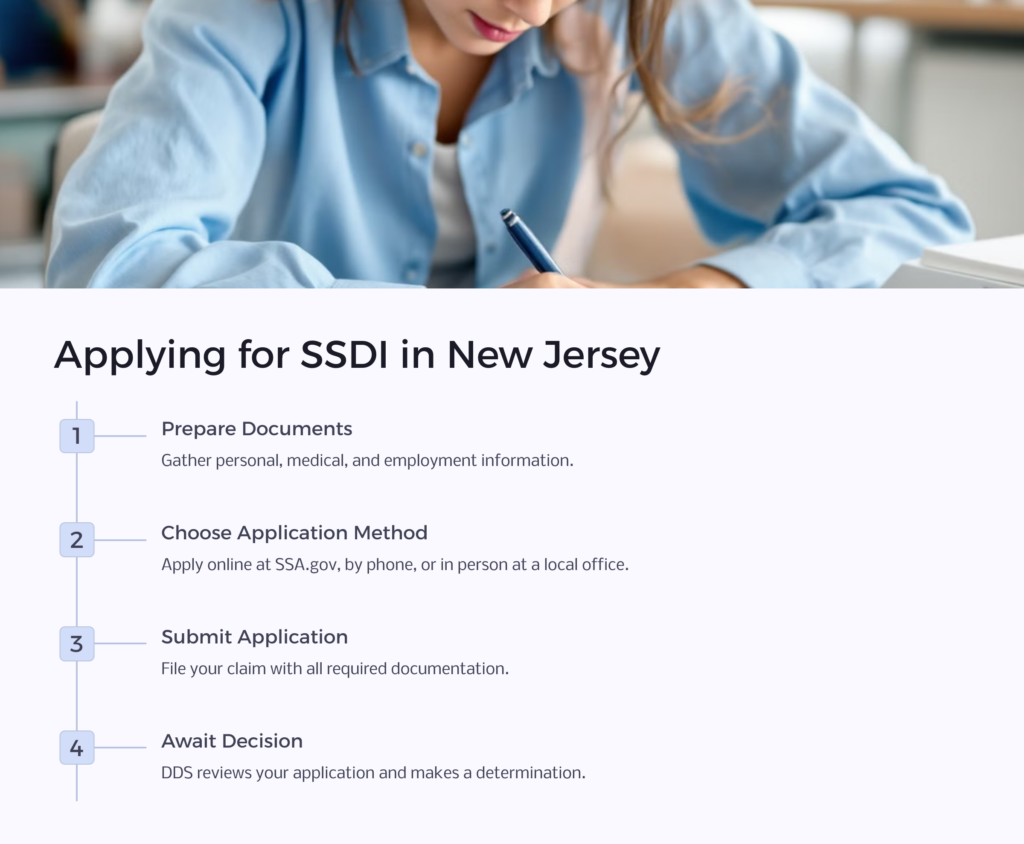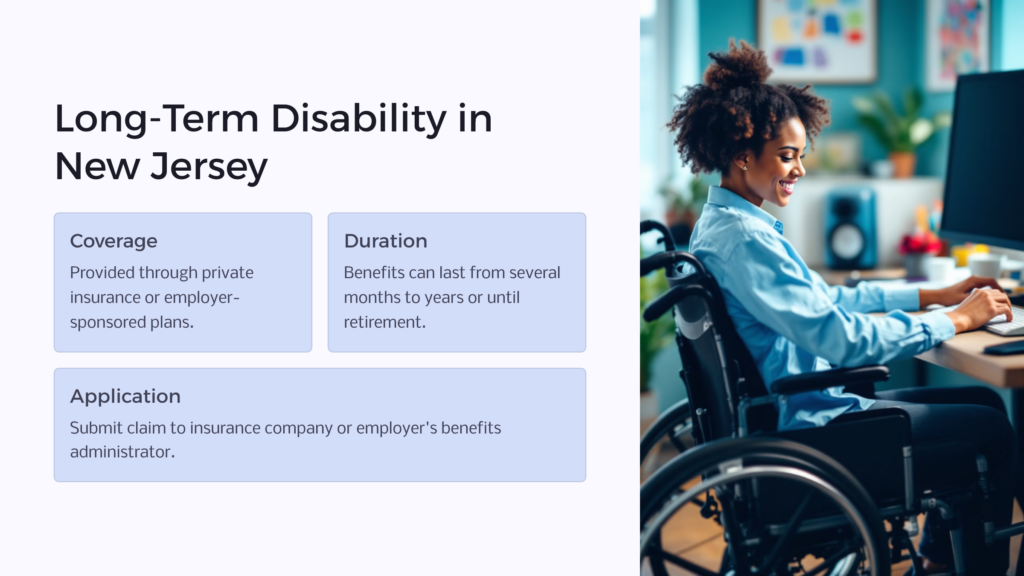New Jersey residents with disabilities can access aid through two federal programs, Social Security Disability Insurance (SSDI) or Supplemental Security Income (SSI). Both programs offer financial assistance in the form of monthly payments for those who qualify.

In addition to federal services, people in New Jersey may also qualify for state unemployment benefits, TDI (Temporary Disability Insurance), Medicaid, or workers’ compensation.
Although SSDI and SSI are federal programs, they are run through the New Jersey Disability Determination Services (DDS). This department is a branch of the state Department of Labor and Workforce Development. New Jersey has 24 Social Security offices and three Offices of Hearings and Appeals (OHA).
Facts About New Jersey
New Jersey is home to more than 1.6 million people who have some sort of disability, which is about 23% of its population. Even with state and federal aid programs, many in the disability community still are not receiving assistance, with only 3.4% of New Jersey residents receiving Social Security disability benefits.
Those with a disability should apply for any program they think they may qualify for as most health insurance plans fall short of supplying the assistance that’s truly needed.
How To Qualify for SSDI in New Jersey
All SSDI recipients across the country must meet the same criteria since the program is federally funded. In New Jersey an applicant must meet the following criteria:

- You have worked long enough as an employee or self-employed and paid federal income tax
- You do not have to be currently working, but if you are, your wages can’t be over $1,310 a month
- Note: New Jersey workers are protected from disability discrimination in the workplace. If you currently hold a job and you have a disability, your employer is required to make any reasonable accommodations to assist you in completing your job.
- Your disability limits your ability to perform work for at least 12 months. These can be physical, intellectual, or developmental disabilities.
- Your condition is found in the Blue Book compiled by the Social Security Administration. These conditions have all been deemed severe enough to impair the ability to work and warrant disability coverage.
Even if all criteria are met, you are still not guaranteed SSDI benefits. Your application must still be reviewed by DDS along with any relevant documentation and evidence to support your disability claim.
How To Apply for SSDI in New Jersey

There are three main ways to file for Social Security Disability: online, over the phone, or in person.
You can improve the chances of having your claim approved and speed up the application process by preparing documents and evidence ahead of time. Below is a general list, and you may need to provide more based on your specific circumstances:
- Personal information: About you, your spouse, and your minor children like full names, and dates and places of birth
- Marriage and divorce records
- Military records
- Current employment or self-employment information
- Bank account information for direct deposit
- Personal or professional references like a doctor or family member who can certify your conditions
- Medical history of your disability like records of physical and mental health, tests, and names of doctors
- Job and education history
Those who wish to apply online will do so on SSA.gov. You may also choose to call the federal Social Security office at 800-772-1213. If you prefer to make your application in person you should call your local New Jersey field office for assistance. Most offices require that you make an appointment before showing up.
How to Appeal a Denial in New Jersey
Unfortunately, the vast majority (around 80%) of initial New Jersey disability claims are denied. This is why if you are a disabled individual it’s essential to ensure you’re fully eligible and you have enough supporting documentation. If you are denied, you can and should begin the appeals process to have your claim reevaluated.
- Reconsideration – Within 60 of your initial denial, you can request to have a new SSA representative from the DDS review your initial claim to make a revised determination.
- Disability Hearing – The next step is to request a hearing with an administrative law judge. Like reconsideration, this request must be made within 60 days of your previous denial. Your hearing will be scheduled to happen in person at your closest SSA Hearing Office in Jersey City, Newark, or Pennsauken. You will likely be asked to bring additional documentation about their disability, and many people choose to obtain legal advice at this point.
- Appeals Council – If your second appeal was denied, you have 60 days to request the Social Security Appeals Council review your case. The council may or may not take your case based on an initial review of the previous decisions.
- Federal Court – The last course of redress is to file a lawsuit by appealing to the district federal court. At this point, you will need an attorney to help file your claim.
Temporary Disability Applications in New Jersey
In New Jersey, those who cannot work due to a non-work-related injury, illness, or pregnancy can apply for temporary disability benefits through the Temporary Disability Insurance (TDI) program. This program is designed to provide financial support to eligible workers temporarily unable to work and earn wages. To initiate a temporary disability application in NJ, eligible employees must first notify their employers about their condition and inability to work. Following this, they can file a claim for temporary disability insurance benefits with the New Jersey Department of Labor and Workforce Development.
Temporary disability benefits typically cover up to two-thirds of that person’s average weekly wage, with a maximum weekly benefit amount set by the state. The duration of the benefits may vary depending on the medical condition and the healthcare provider’s certification of the disability. Individuals may receive benefits for up to 26 weeks in a benefit year.
Please note that temporary disability insurance is distinct from Paid Family Leave (PFL) benefits in New Jersey. Paid Family Leave provides wage replacement benefits to eligible employees who need time off to care for a seriously ill family member or to bond with a new child (including adoption or foster care). Both temporary disability and paid family leave benefits are funded through employee payroll deductions. For employees who require longer-term disability coverage beyond the 26 weeks, they may need to explore other options, such as short-term disability insurance or private long-term disability insurance plans.
The New Jersey Department of Labor and Workforce Development is responsible for administering disability benefits in the state. Their website provides comprehensive information about the temporary disability application process, eligibility criteria, and frequently asked questions to assist applicants.
How Does Long-Term Disability Work in New Jersey?

Long-term disability coverage provides financial protection for people unable to work due to a serious illness or injury that extends beyond the scope of short- or mid-term disability benefits.
Long-term disability benefits in New Jersey are typically provided through private insurance policies or employer-sponsored group plans. These benefits are meant to replace a portion of your income when you can’t work for an extended period—usually lasting for several months to several years or even until retirement age.
For long-term disability, the disability’s duration is important, as it must exceed the waiting period specified in the policy, usually ranging from 90 to 180 days.
Applying for long-term disability benefits in New Jersey typically involves submitting a claim to the insurance company or the employer’s benefits administrator. The application process may require medical records, healthcare provider documentation, and other relevant evidence to support the disability claim. It’s important to carefully review the specific requirements outlined in the policy and ensure that all necessary information is included in the application.
One key difference between short- or mid-term disability and long-term disability is the duration of coverage. Short-term disability benefits typically last a few weeks to several months, while mid-term disability coverage extends up to one year. However, long-term disability benefits can provide coverage for an extended period, ranging from several months to years.
More New Jersey Benefits
SSI
Supplemental Security Income (SSI) is another disability program run by the SSA. Like SSDI, SSI provides monthly cash benefits for New Jersey residents, but you do not necessarily have to have a disability to qualify. SSI benefits are reserved for low-income individuals who are either blind, disabled, or over the age of 65.
New Jersey Medicaid
Those who qualify for SSI in New Jersey automatically qualify for New Jersey Medicaid. Once you are approved for SSI you will get a separate letter of acceptance from Medicaid outlining your benefits. Medicaid is for those with permanent disabilities, pregnant women, families with dependent children, or seniors 65 and older. The income requirements for regular Medicaid for a single person are $1,073 a month.
New Jersey Temporary Disability and Family Leave Insurance
New Jersey Temporary Disability Benefits (TDI) is a division of the Department of Labor and Workforce Development. This program provides a cash benefit to those who temporarily can’t work due to an illness or injury that is not work related.
If your employer has a state plan you’ll apply online, and if they have a private plan from an insurance company your employer will instruct you how to apply. The program also provides paid maternity or paternity leave for a worker to bond with a new child, or medical leave to take care of an ill family member or one who has been exposed to a communicable disease.
To qualify, you need to have made payments into the program, and also meet gross earning requirements (at least $11,000 in a calendar year, or an average weekly wage of at least $220). The employee contribution rate is currently at 0.47% of an employee’s taxable wage base. The payroll deduction to pay these cannot exceed $649.54 per year. An eligible employee is then paid 85% of their average weekly wage with a maximum of $903 per week.
New Jersey Unemployment
New Jersey Unemployment benefits provide temporary benefits in the form of a weekly payout to those who have lost their job through no fault of their own. The program is run through the New Jersey Department of Labor and Workforce Development and is funded through employer contribution via payroll tax. The maximum weekly benefit is $713 and can be collected for up to 26 weeks.
New Jersey Social Security Offices
| SSA Field Office Locations in New Jersey | ||
| Newark SSA Office | 970 Broad Street Room 1035 Newark, NJ 7102 | (877) 255-1507 |
| Trenton SSA Office | 635 S Clinton Ave Roebling Market Trenton, NJ 8611 | (866) 964-0026 |
| Cherry Hill SSA Office | Suite 200 6 Executive Campus Cherry Hill, NJ 8002 | (866) 931-2879 |
| Paterson SSA Office | 200 Federal Plz First Floor Paterson, NJ 7505 | (888) 397-9806 |
| Union Township SSA Office | 855 Lehigh Ave Union, NJ 7083 | (877) 803-6306 |
| Woodbridge SSA Office | 190 Middlesex Trnpk 3rd Floor Iselin, NJ 8830 | (877) 600-2852 |
| Jersey City SSA Office | 325 West Side Avenue Jersey City, NJ 7305 | (877) 405-2884 |
| Clifton SSA Office | 935 Allwood Rd Clifton, NJ 7012 | (866) 964-0170 |
| Egg Harbor Twp SSA Office | 1350 Doughty Rd Egg Harbor Twp, NJ 8234 | (877) 714-0394 |
| Bridgeton SSA Office | 149 West Broad Street Bridgeton, NJ 8302 | (866) 837-1235 |
| Neptune SSA Office | 3310 State Route 66 Neptune, NJ 7753 | (877) 405-0475 |
| Hackensack SSA Office | 401 Hackensack Ave Continental Plz 2nd Floor Hackensack, NJ 7601 | (866) 964-4680 |
| East Orange SSA Office | 7 Glenwood Ave Ste 100 East Orange, NJ 7017 | (866) 964-0030 |
| Parsippany SSA Office | 2200 State Rt 10 2nd Floor Parsippany, NJ 7054 | (866) 331-7131 |
| New Brunswick SSA Office | 550 Jersey Avenue Suite 200 New Brunswick, NJ 8901 | (877) 803-6313 |
| Springfield Ave SSA Office | 274 Springfield Ave Newark, NJ 7103 | (877) 402-0821 |
| Glassboro SSA Office | 830 Delsea Dr North Glassboro, NJ 8028 | (866) 883-5305 |
| Toms River SSA Office | 190 St Catherine Blvd Toms River, NJ 8755 | (877) 255-1497 |
| Rio Grande SSA Office | 1046 Route 47 South Rio Grande, NJ 8242 | (877) 405-9194 |
| Bridgewater SSA Office | 245 Highway 22 Suite 207 Bridgewater, NJ 8807 | (866) 446-6198 |
| Hoboken SSA Office | 79 Hudson St 6th Floor Hoboken, NJ 7030 | (877) 505-4547 |
| Mt Laure SSA Office | 532 Fellowship Rd Suite E Mount Laurel, NJ 8054 | (866) 837-5002 |
| Newton SSA Office | 20 East Clinton Street Newton, NJ 7860 | (877) 575-5189 |
| Brick SSA Office | 2620 Yorktowne Blvd Brick, NJ 8723 | (877) 405-5870 |
New Jersey Hearing and Appeal Offices
New Jersey is in Region 2 (New York), which services New Jersey, New York, Puerto Rico, and U.S. Virgin Islands.
| Region 2 – SSA Office of Hearing Operations in New Jersey | ||
| SSA Hearing Office – Jersey City | 325 West Side Avenue Second Floor Jersey City, NJ 7305 | (877) 773-7451 |
| SSA Hearing Office – Newark | 1100 Raymond Boulevard 3rd Floor Newark, NJ 7102 | (877) 405-9798 |
| SSA Hearing Office – Pennsauken | 2475 McClellan Avenue Pennsauken, NJ 8109 | (866) 964-5769 |
 Benefits.com Advisors
Benefits.com Advisors
With expertise spanning local, state, and federal benefit programs, our team is dedicated to guiding individuals towards the perfect program tailored to their unique circumstances.
Rise to the top with Peak Benefits!
Join our Peak Benefits Newsletter for the latest news, resources, and offers on all things government benefits.



















